This post contains affiliate links. Please see our disclosure policy.
You can feed your sourdough starter different types of flour as long as the flour you’re using is wheat flour or at least similar to wheat flour and gives your sourdough starter the starches it needs to produce carbon dioxide (this is what rises your sourdough bread).
There are a few guidelines you’ll need to consider when changing your sourdough starter’s flour and I’ll go into more detail below, but in summary:
- Yes you can change the type of flour you feed your sourdough starter
- Keep an eye on how your starter behaves after the first feeding
- Keep your starter warm and regularly fed when changing flours
- You don’t have to feed your starter the same flour as you’re using in your sourdough bread recipe.

This question, along with some variations, gets asked a lot in my Facebook Group so I thought I would put together a guide on how to change the flour in your sourdough starter and what you can expect when you do this in order to help you as a home baker making sourdough bread.
You can find my guide to making a sourdough starter here, just in case you need to refer to it and my sourdough recipe here. You’ll also find specific instructions for making a rye sourdough starter here.

Table of Contents
- What Flour Should I Be Feeding My Sourdough Starter With?
- What Should I Expect When I Change Flours?
- Why Would I Change My Starter To A Different Flour?
- How Can I Use A Levain To Test A New Flour?
- Can I Feed My Sourdough Starter Different Flour To The Recipe?
- Can I Mix The Flours In My Sourdough Starter?
- Will Changing Flour Give My Sourdough Starter a Boost?
- How Can I Switch To A New Type of Flour?
- Sourdough Starter Resources
What Flour Should I Be Feeding My Sourdough Starter With?
You can feed your sourdough starter with any flour you like, as long as it provides the starches the wild yeast in your sourdough starter need to convert to Co2 to rise your dough. The flour you choose should always be unbleached flour.
The best flour for feeding a sourdough starter is:
- All Purpose Flour (Plain Flour)
- Bread Flour
- Whole Wheat Flour (Wholemeal Flour)
- Rye Flour
Obviously, if you are establishing a gluten free starter, you’ll need to look at alternatives to these flours. But all purpose, bread flour, whole wheat flour or rye flour are all suitable for feeding a regular sourdough starter successfully.
Many people like to feed their sourdough starter a cheaper flour, particularly when in the establishment phase and going through quite a bit of it. They then save their more expensive flour (like King Arthur Flour or organic flour) for baking their actual sourdough bread.
It’s really up to you what flour you choose to feed your own sourdough starter with – as long as you stick with a wheat flour for a regular sourdough starter.

Quick Reference Guide – Which Flour For Sourdough Starter?

What Should I Expect When I Change Flours?
Every sourdough starter is a unique living organism. The way your sourdough starter behaves after you change the flour you feed it can cover quite a spectrum, however on the whole you may see one or all of the following happen when you feed your sourdough starter different types of flour:
- Your starter may go into shock and stop rising and bubbling in the short term. Just keep feeding it twice a day and it will bounce back.
- If changing your flour from All Purpose to a more whole grain flour like rye, you may notice an instant improvement in starter activity.
- Your starter might smell really bad or really good – but just give it time to adjust. The smell will more than likely change with the change of flour.
- Changes in consistency are normal. White flour can result in a runnier starter and whole grains may give you a thicker, mousse like structure.
Some of the things you can do for your sourdough starter to lessen the shock of adjusting to a new food source are:
- Use warm water to feed your sourdough starter when changing flours to encourage the natural yeast and bacteria and lessen the shock and stress.
- Continue to use equal parts flour and water, even when changing over the type of flour you’re using.
- Keep your sourdough starter in a warm place (or at least at room temperature). Do not put it in the fridge for at least a week after changing to a different flour).
- Stir your sourdough starter a few times in between each scheduled feed to encourage plenty of oxygen.
Even if your sourdough starter seems to react badly to a new flour, just be consistent in your feeding schedule and after a few days you should have a happy and healthy starter again.
Why Would I Change My Starter To A Different Flour?
There are lots of reasons to change the flour you feed your sourdough starter with. But some of the more common reasons for changing flours are:
- You can’t find the flour you’ve been using at the grocery stores, so you need to swap to one that’s more readily available.
- You want to increase the sour flavor in your starter and bread so want to change to a more whole grain flour.
- Your starter needs a boost or something to kick it into action and increase the fermentation process.
- You’re just curious to see how a different flour will affect the rise, taste and consistency of your sourdough starter.
- You are wanting to create a stiff starter.
- You need to eat a particular type of flour for health reasons, so want to change your starter to that flour. For example you need to now bake only spelt sourdough bread.
How Can I Use A Levain To Test A New Flour?
A levain is a really easy and safe way to test out how your sourdough starter will react to a new flour. Building a levain means to take a small amount of your “mother starter” and create an “offshoot”. This offshoot is generally made for a specific recipe, but it’s also a really good way to ensure that you don’t damage your original mother culture in testing out a new flour.
I’ve written a guide to building levains here.

Can I Feed My Sourdough Starter Different Flour To The Recipe?
Yes you can feed your sourdough starter a different flour to the bread you are making.
For example, if you are making this whole wheat rye sourdough bread, you can use your sourdough starter that has been fed with all purpose flour. Or if you have a rye starter, you can still use that in a regular sourdough recipe made with bread flour. While there may be some rye flour in the bread, it won’t have an overpowering rye flavor as majority of the flavor will come from the bread flour.
Of course, if you want to feed your sourdough starter with the same flour as the bread recipe you’re making, you would go ahead and build a levain or preferment without actually changing the food source for your sourdough starter.
Can I Mix The Flours In My Sourdough Starter?
Yes you can mix the flours in your sourdough starter. This can be an economical way to add some whole grains or rye. So you might want to feed 25% rye and 75% all purpose for example. There’s really no hard and fast rules for what ratio of flour you use.
An easy way to do this would be to feed 40g of sourdough starter with 10g of rye and 30g of all purpose. Or just go half and half to make it even simpler to calculate.
Mixing different flours in your sourdough starter can encourage a more complex flavor to develop in your sourdough starter.
Will Changing Flour Give My Sourdough Starter a Boost?
Sometimes changing the flour you feed your sourdough starter with can give it a boost. This is particularly true of rye flour or other whole grains or organic flours.
Rye is known as a super food for sourdough starters and will often wake up a tired, lack lustre starter with a hit of different yeast and bacteria. However changing your starter from a whole grain flour to a more white flour may actually have the opposite effect.

How Can I Switch To A New Type of Flour?
Switching your sourdough starter to a different flour is fairly simple. There are a few different ways you can do it, depending on how much of the flour you have and how much time you want to spend on it.
If you want to feed your sourdough starter with a different flour:
- Just start feeding the starter with the new flour straight up – simply switch the flour over and feed it in one feeding and then continue for subsequent feeds.
- Switch the flour over gradually by slowly increasing the new flour (day 1 25%, day 2 50%, day 3 75% etc).
- Build a levain with the new flour instead of actually changing the whole starter culture over.
You can use the discard from your sourdough starter while you are changing flours, even if it’s not bubbling or doubling (so long as your sourdough starter is at least 7 days old). You’ll find 60+ sourdough discard recipes here.
Sourdough Starter Resources
If you’re building a sourdough starter from scratch, you might also find some of these resources helpful:
- How To Feed A Sourdough Starter
- Sourdough Starter Troubleshooting
- Is the Float Test Really Necessary?
- Best Jar for Sourdough Starters
- How To Strengthen a Sourdough Starter
- Does the Amount of Starter Matter?
- How to Make Great Sourdough Bread with All Purpose Flour

| TYPE OF FLOUR | WHEAT STARTER | GLUTEN FREE STARTER |
|---|---|---|
| ALL PURPOSE FLOUR (PLAIN FLOUR) | YES | NO |
| BREAD FLOUR | YES | NO |
| WHOLE GRAIN FLOUR | YES | NO |
| WHOLE WHEAT FLOUR | YES | NO |
| RYE FLOUR (DARK OR LIGHT) | YES | NO |
| SELF RAISING FLOUR | NO | NO |
| BUCKWHEAT | NO | YES |
| OAT FLOUR | NO | YES |
| RICE FLOUR (BROWN OR WHITE) | NO | YES |
| EINKORN FLOUR | YES | NO |
| SPELT FLOUR (WW OR WHITE) | YES | NO |
| SEMOLINA FLOUR | YES | NO |
| EMMER FLOUR | YES | NO |


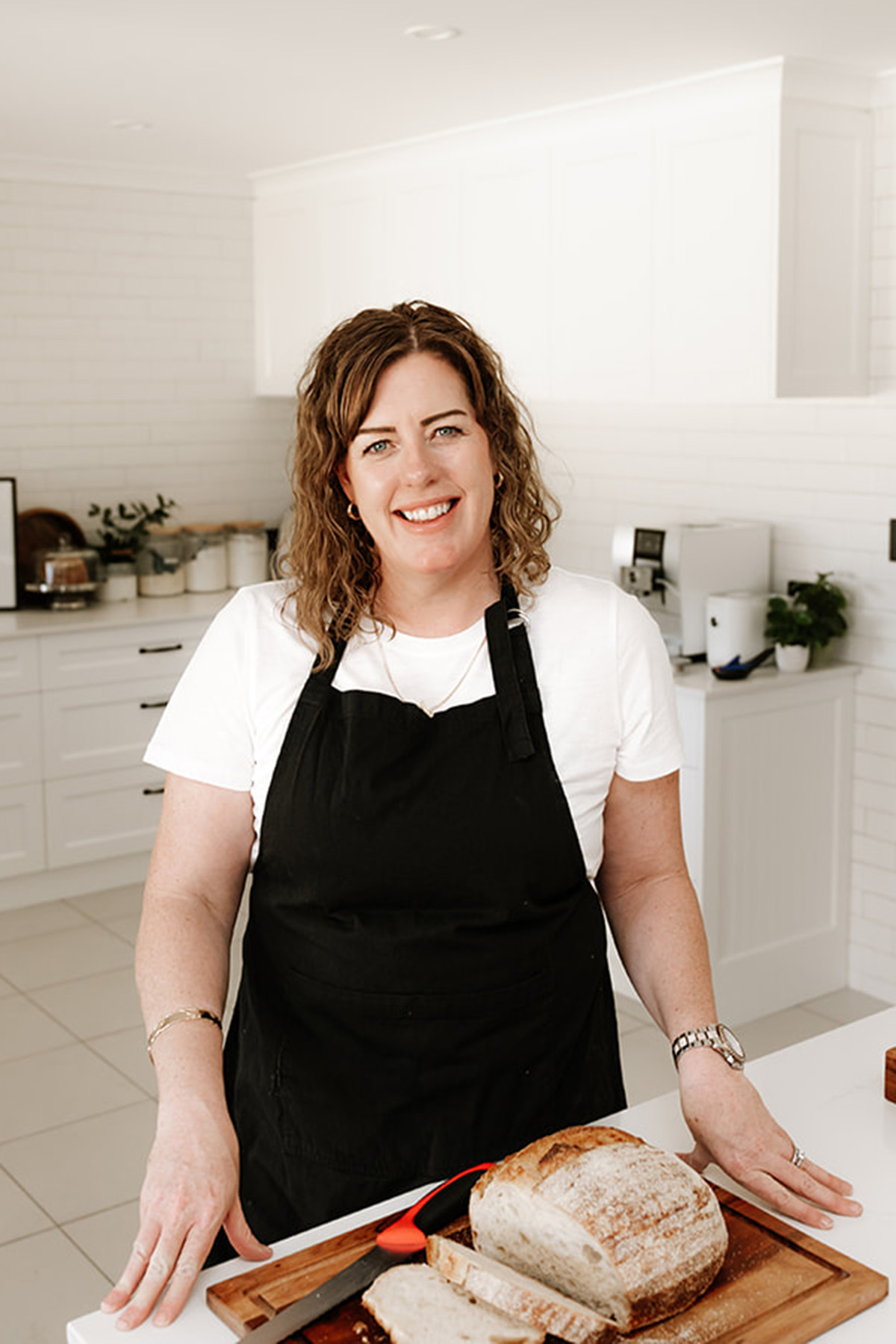
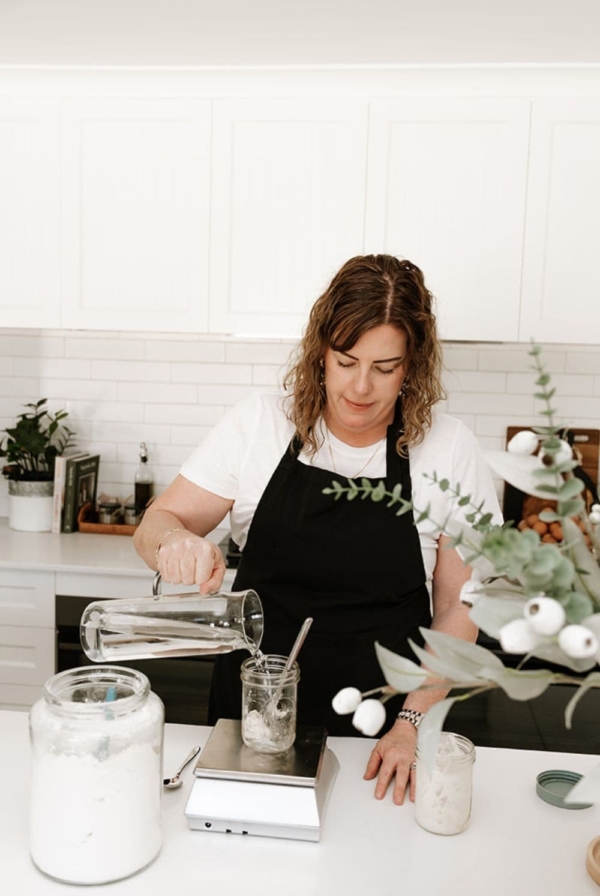
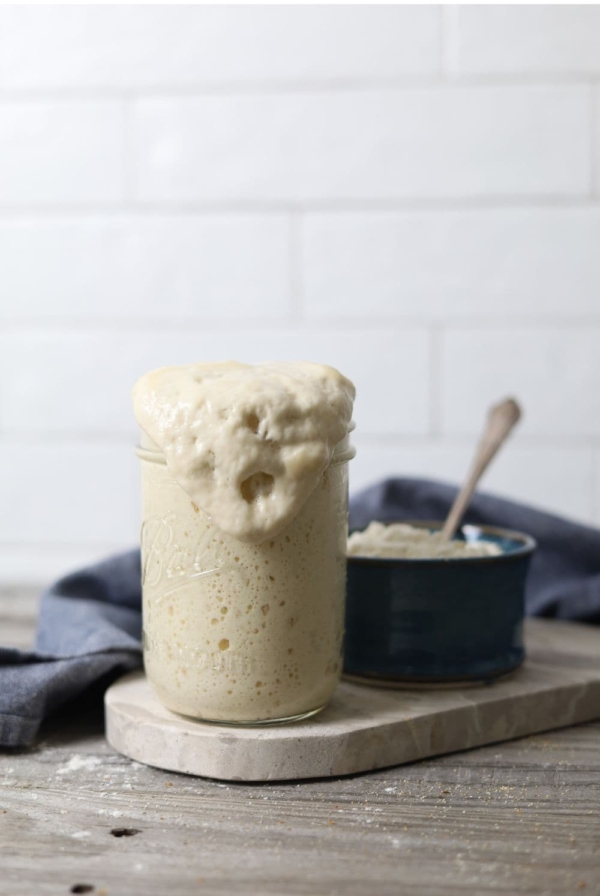
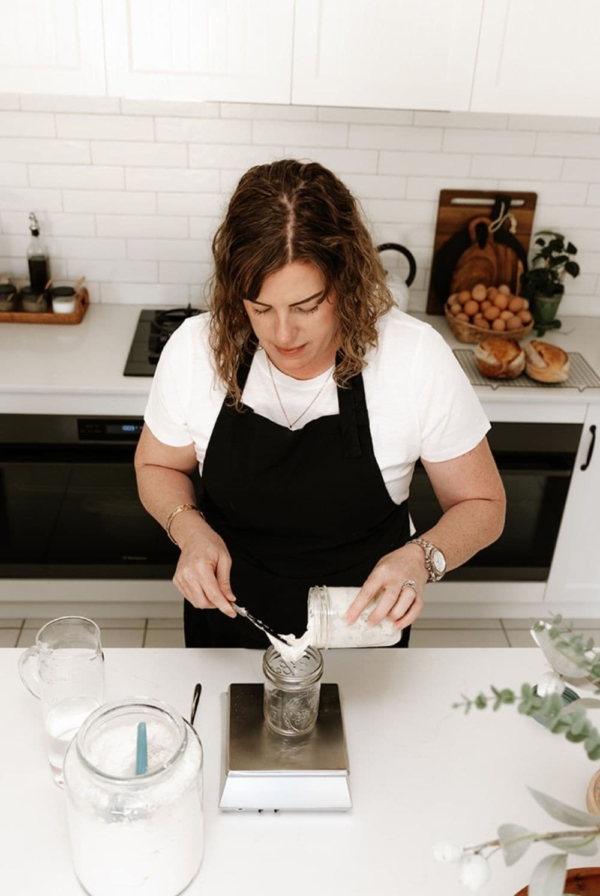
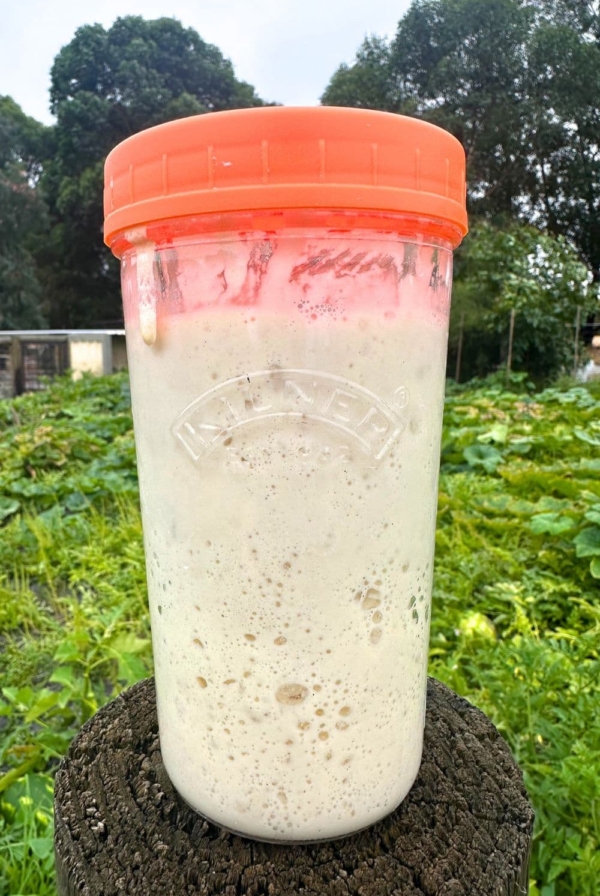




Thank you so much for this informative article. I recently changed my flour due to moving to another state where I couldn’t find my previous brand. I thought I killed my starter for a couple days. There was almost no activity and I learned a valuable lesson. . Don’t try to bake a loaf of bread when you are adjusting your starter. I had very dense flat loaves for 3 days. Now it’s back to being a beautiful active starter, making perfect loaves of bread.
This article was super helpful! I’m excited to transition to whole wheat flour!
Question- what is you started with bleached flour? Should you start over? I’m on day 8
Not sure my question went through about using reg sourdough starter to make whole-wheat bread.
Hi, I bought a packet of Dark Rye Flour. The ingredient list states: Rye Flour, Barley Malt Flour.
Is this suitable to use it to feed my starter?
I usually feed my starter all purpose flour, but a pizza recipe calls for feeding my starter bread flour. Could I just make a levain with the bread flour and use that for the recipe without issue?
Hi. Excellent article: I really appreciate the level of knowledge you share. Thanks!
A question, if I may: I have a lovely San Francisco starter that I bought, as my house doesn’t contain really tasty yeast strains. It’s been eating white wheat flour, but I’d like to give up wheat. Can I switch it permanently to all rye flour? Ta!
I am expanding my sourdough starter knowledge. I’d like to use rye flour, but a 100% hydration is too dense. It’s more like a putty. Is this OK, or should I increase the water? If so, by how much?
Once your starter doubles within 4-6 hours, do you still wait the 12 to feed, until ready to bake?
Thank you for this article. I’m very new to sourdough bread making. Because of health issues the only bread I can eat is Spelt Sourdough. Well, good luck trying to buy that LOL. So, i made a starter of pure spelt and it seems to be doing well. I have it at the point where I used the discard from the original to start a second one and they are both growing at the same rate together. I find if I feed it at 2:00pm by 6:00pm it has grown significantly and by about 10:00pm it has doubled. The next morning around 8:00 am it deflates. My room smells very yeasty. I use a ratio of half the starter (which varies in volume) 100g water and 100g of spelt. I think the starter is about 2-3 weeks old. I forgot to note when I started it. My problem is, I want to start baking about 9:00am but am having trouble coordinating the times. By 9:00am it has deflated. If I feed it and wait for it to grow, its too late in the day to start baking. Any suggestions?
I am new to your site, very helpful! So much great information. I was given a starter and was told to feed it 100g flour, 100g water, 30g starter. Is this OK?
Rather than 1-1-1 ratio which I have read is also done.
Also I just accidentally fed my starter with 00 pizza flour, did I just ruin my starter? I had been feeding it with AP flour and just a bit of Rye.
Thank you for your help!
Hey there,
I have a sourdough starter I started with dark rye flour. I had purchased some light rye flour a while ago and it’s in my freezer, can I use that and should I let it come to room temperature first?
Yes absolutely you can do that 🙂
Thank you for writing this article. It was a good informative read. I feed my starter different flowers daily. Whatever I have on hand and random mixes are the norm for me. as yeast is a very adaptive organism, I think the yeast my starter have adapted to this and I see no deficiency im their activity or flavor.
It’s a fun experiment